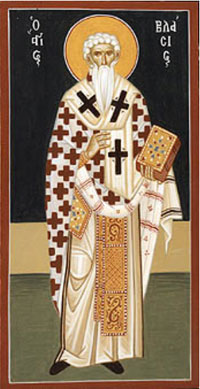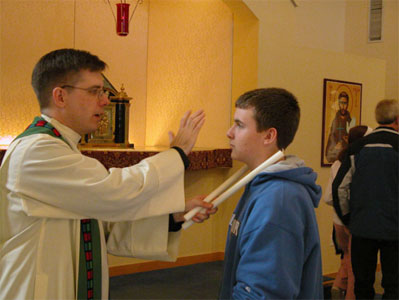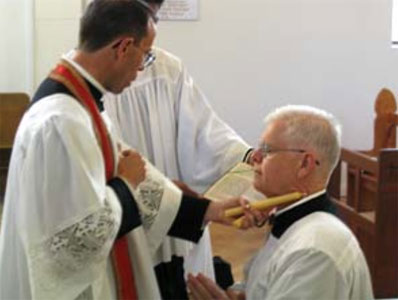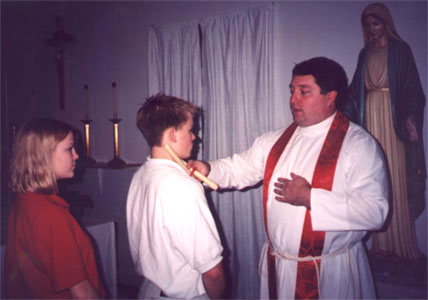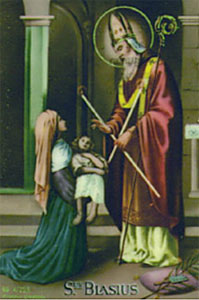Blessing of Throats on the Feast of Saint Blase
1622 "Suffering and illness have always been among the greatest problems that trouble the human spirit. Christians feel and experience pain as do all other people; yet their faith helps them to grasp more deeply the mystery of suffering and to bear their pain with greater courage. . . . Part of the plan laid out by God's providence is that we should fight strenuously against all sickness and carefully seek the blessings of good health, so that we may fulfill our role in human society and in the Church" (see endnote 4).
1623 "The blessing of the sick by ministers of the Church is a very ancient custom, rooted in imitation of Christ himself and his apostles" (see endnote 5).
1624 In the United States the annual blessing of throats is a traditional sign of the struggle against illness in the life of the Christian. This blessing is ordinarily given during Mass or a celebration of the word of God on February 3, the memorial of Saint Blase.
1625 Saint Blase was the bishop of Sebaste in Armenia during the fourth century. Very little is known about his life. According to various accounts (see endnote 6) he was a physician before becoming a bishop. His cult spread throughout the entire Church in the Middle Ages because he was reputed to have miraculously cured a little boy who nearly died because of a fishbone in his throat. From the eighth century he has been invoked on behalf of the sick, especially those afflicted with illnesses of the throat.
1626 The blessing of throats may be given by a priest, deacon, or a lay minister who follows the rites and prayers designated for a lay minister. If the blessing is conferred during Mass, the blessing follows the homily and general intercessions, or, for pastoral reasons, the prayer of blessing may take the place of the final blessing of the Mass. When the blessing is given outside Mass, it is preceded by a brief celebration of the word of God. If the blessing is to be celebrated at Morning Prayer or Evening Prayer, it is given after the reading and responsory (and homily) and before the gospel canticle.
1627 The blessing may be given by touching the throat of each person with two candles blessed on the feast of the Presentation of the Lord (February 2) and which have been joined together in the form of a cross.
1628 If, for pastoral reasons, each individual cannot be blessed in the manner described in no. 1627, for example when great numbers are gathered for the blessing or when the memorial of Saint Blase occurs on a Sunday, a priest or deacon may give the blessing to all assembled by extending hands, without the crossed candles, over the people while saying the prayer of blessing. A lay minister says the prayer proper to lay ministers without making the sign of the cross.
1629 The blessing may also be given to the sick or the elderly in their homes when they cannot attend the parish celebration.
Endnotes: 4. Pastoral Care of the Sick: Rites of Anointing and Viaticum, nos. 1, 3. 5. Rituale Romanum: De Benedictionibus, Chapter 2: "Blessing of the Sick," no. 1. 6. Metaphrastes, Vita Sanctorum in Migne, Patrologia Graeca 116:817. See also Roman Martyrology, February 3.
I. ORDER OF BLESSING WITHIN MASS
INTRODUCTORY RITES
1630 After the celebrant has greeted the people, he may introduce the celebration in these or similar words. Today we celebrate the feast of Saint Blase, who was bishop of Sebaste in Armenia in the fourth century. Before being martyred, he is said to have healed a boy who was choking. Since the eighth century, Saint Blase has been venerated as the patron of those who suffer from diseases of the throat. We pray in a special way today for protection from afflictions of the throat and from other illnesses. The blessing of Saint Blase is a sign of our faith in God's protection and love for us and for the sick.
1631 After the gospel reading, the celebrant in the homily, based on the sacred text and pertinent to the particular place and the people involved, explains the meaning of the celebration.
GENERAL INTERCESSIONS
1632 The general intercessions follow, either in the form usual at Mass or in the form provided here. The celebrant concludes the intercessions with the prayer of blessing. From the following intentions those best for the occasion may be used or adapted, or other intentions that apply to the particular circumstances may be composed.
The celebrant says: Let us now pray for those who are sick and suffering, for those who care for the sick, and for all who seek the blessings of good health.
R. Lord, hear our prayer.
Or: R. Lord, have mercy.
Assisting minister: For those who suffer from sickness and disease, that they may receive healing, we pray to the Lord. R.
Assisting minister: For the mentally ill and for their families, that they may receive comfort, we pray to the Lord. R.
Assisting minister: For those with physical disabilities, that the strength of Christ may invigorate them, we pray to the Lord. R.
Assisting minister: For doctors and nurses, and for all who care for the sick, we pray to the Lord. R.
Assisting minister: For those who seek the prayers of Saint Blase today, that they may be protected from afflictions of the throat and other forms of illness, we pray to the Lord. R.
PRAYER OF BLESSING
1633 With the crossed candles touched to the throat of each person, the celebrant says immediately: Through the intercession of Saint Blase, bishop and martyr, may God deliver you from every disease of the throat and from every other illness:
In the name of the Father, and of the Son, + and of the Holy Spirit.
Each person responds: Amen.
During the blessing suitable psalms or other suitable songs may be sung.
1634 A lay minister touches the throat of each person with the crossed candles and, without making the sign of the cross, says the prayer of blessing. Through the intercession of Saint Blase, bishop and martyr, may God deliver you from every disease of the throat and from every other illness:
In the name of the Father, and of the Son, and of the Holy Spirit.
Each person responds: Amen.
1635 If all cannot be blessed individually, the celebrant, without candles, extends his hands over the assembly and says the prayer of blessing.
II. ORDER OF BLESSING WITHIN A CELEBRATION OF THE WORD OF GOD
1636 The present order may be used by a priest or a deacon, and also by a lay person, who follows the rites and prayers designated for a lay minister.
INTRODUCTORY RITES
1637 When the community has gathered, a suitable song may be sung. After the singing, the minister says: In the name of the Father, and of the Son, and of the Holy Spirit.
All make the sign of the cross and reply: Amen.
1638 A minister who is a priest or deacon greets those present in the following or other suitable words, taken mainly from sacred Scripture. The grace and peace of God the Father and the Lord Jesus Christ be with you.
And all reply: And also with you.
1639 A lay minister greets those present in the following words: Let us praise the God and Father of our Lord Jesus Christ. R. Blessed be God for ever.
1640 In the following or similar words, the minister prepares those present for the blessing. Today we celebrate the feast of Saint Blase, who was bishop of Sebaste in Armenia in the fourth century. Before being martyred, he is said to have healed a boy who was choking. Since the eighth century, Saint Blase has been venerated as the patron of those who suffer from diseases of the throat. We pray in a special way today for protection from afflictions of the throat and from other illnesses. The blessing of Saint Blase is a sign of our faith in God's protection and- love for us and for the sick.
READING OF THE WORD OF GOD
1641 A reader, another person present, or the minister reads a text of sacred Scripture. Brothers and sisters, listen to the words of the holy gospel according to Mark:
16:15-20 They will place their hands on the sick and they will recover. Jesus said to the eleven, "Go into the whole world and proclaim the gospel to every creature. Whoever believes and is baptized will be saved; whoever does not believe will be condemned. These signs will accompany those who believe: in my name they will drive out demons, they will speak new languages. They will pick up serpents with their hands, and if they drink any deadly thing, it will not harm them. They will lay hands on the sick, and they will recover."
1642 Or: Matthew 8:14-17--Peter's mother-in-law is healed.
1643 As circumstances suggest, one of the following responsorial psalms may be sung, or some other suitable song.
R. Taste and see the goodness of the Lord.
Psalm 34 I will bless the LORD at all times; his praise shall be ever in my mouth. Let my soul glory in the LORD; the lowly will hear me and be glad. R.
Glorify the LORD with me, let us together extol his name. I sought the LORD, and he answered me and delivered me from all my fears. R.
Look to him that you may be radiant with joy, and your faces may not blush with shame. When the afflicted man called out, the LORD heard, and from all his distress he saved him. R.
The angel of the LORD encamps around those who fear him, and delivers them. Taste and see how good the LORD is; happy the man who takes refuge in him. R.
Fear the LORD, you his holy ones, for nought is lacking to those who fear him. The great grow poor and hungry; but those who seek the LORD want for no good thing. R.
Come, children, hear me; I will teach you the fear of the LORD. Which of you desires life, and takes delight in prosperous days? R.
Keep your tongue from evil and your lips from speaking guile; Turn from evil and do good; seek peace, and follow after it. R.
Psalm 27 R. (v. 14) Put your hope in the Lord; take courage and be strong.
1644 As circumstances suggest, the minister may give those present a brief explanation of the biblical text, so that they may understand through faith the meaning of the celebration.
INTERCESSIONS
1645 The intercessions are then said. The minister introduces them and an assisting minister or one of those present announces the intentions. From the following those best suited to the occasion may be used or adapted, or other intentions that apply to the particular circumstances may be composed.
The minister says: Let us now pray for those who are sick and suffering, for those who care for the sick, and for all who seek the blessings of good health.
R. Lord, hear our prayer.
Or: R. Lord, have mercy.
Assisting minister: For those who suffer from sickness and disease, that they may receive healing, we pray to the Lord. R.
Assisting minister: For the mentally ill and for their families, that they may receive comfort, we pray to the Lord. R.
Assisting minister: For those with physical disabilities, that the strength of Christ may invigorate them, we pray to the Lord. R.
Assisting minister: For doctors and nurses, and for all who care for the sick, we pray to the Lord. R.
Assisting minister: For those who seek the prayers of Saint Blase today, that they may be protected from afflictions of the throat and other forms of illness, we pray to the Lord. R.
1646 After the intercessions the minister, in the following or similar words, invites all present to sing or say the Lord's Prayer. With confidence we call upon the Lord, saying:
All: Our Father . . .
PRAYER OF BLESSING
1647 A minister who is a priest or deacon touches the throat of each person with the crossed candles and says the prayer of blessing. Through the intercession of Saint Blase, bishop and martyr, may God deliver you from every disease of the throat and from every other illness:
In the name of the Father, and of the Son, + and of the Holy Spirit.
Each person responds: Amen.
During the blessing suitable psalms or other suitable songs may be sung.
1648 A lay minister touches the throat of each person with the crossed candles and, without making the sign of the cross, says the prayer of blessing. Through the intercession of Saint Blase, bishop and martyr, may God deliver you from every disease of the throat and from every other illness:
In the name of the Father, and of the Son, and of the Holy Spirit.
Each person responds: Amen.
1649 After receiving the blessing each person may depart.
1650 If all cannot be blessed individually, a minister who is a priest or deacon, without candles, may extend his hands over the assembly and say the prayer of blessing. A lay minister says the prayer proper to lay ministers without making the sign of the cross.
III. SHORTER RITE
1651 All make the sign of the cross as the minister says: Our help is in the name of the Lord.
All reply: Who made heaven and earth.
1652 One of those present or the minister reads a text of sacred Scripture, for example: Brothers and sisters, listen to the words of the holy gospel according to Mark:
16:15-20 They will place their hands on the sick and they will recover. Jesus said to the eleven, "Go into the whole world and proclaim the gospel to every creature. Whoever believes and is baptized will be saved; whoever does not believe will be condemned. These signs will accompany those who believe: in my name they will drive out demons, they will speak new languages. They will pick up serpents with their hands, and if they drink any deadly thing, it will not harm them. They will lay hands on the sick, and they will recover."
1653 Or: Matthew 8:14-17--Peter's mother-in-law is healed.
1654 A minister who is a priest or deacon touches the throat of each person with the crossed candles and says the prayer of blessing. Through the intercession of Saint Blase, bishop and martyr, may God deliver you from every disease of the throat and from every other illness:
In the name of the Father, and of the Son, + and of the Holy Spirit.
Each person responds: Amen.
1655 A lay minister touches the throat of each person with the crossed candles and, without making the sign of the cross, says the prayer of blessing. Through the intercession of Saint Blase, bishop and martyr, may God deliver you from every disease of the throat and from every other illness:
In the name of the Father, and of the Son, and of the Holy Spirit.
Each person responds: Amen.
Prayer Source: Book of Blessings by Prepared by International Commission on English in the Liturgy A Joint Commission of Catholic Bishops' Conferences, The Liturgical Press, Collegeville, Minnesota, 1989
